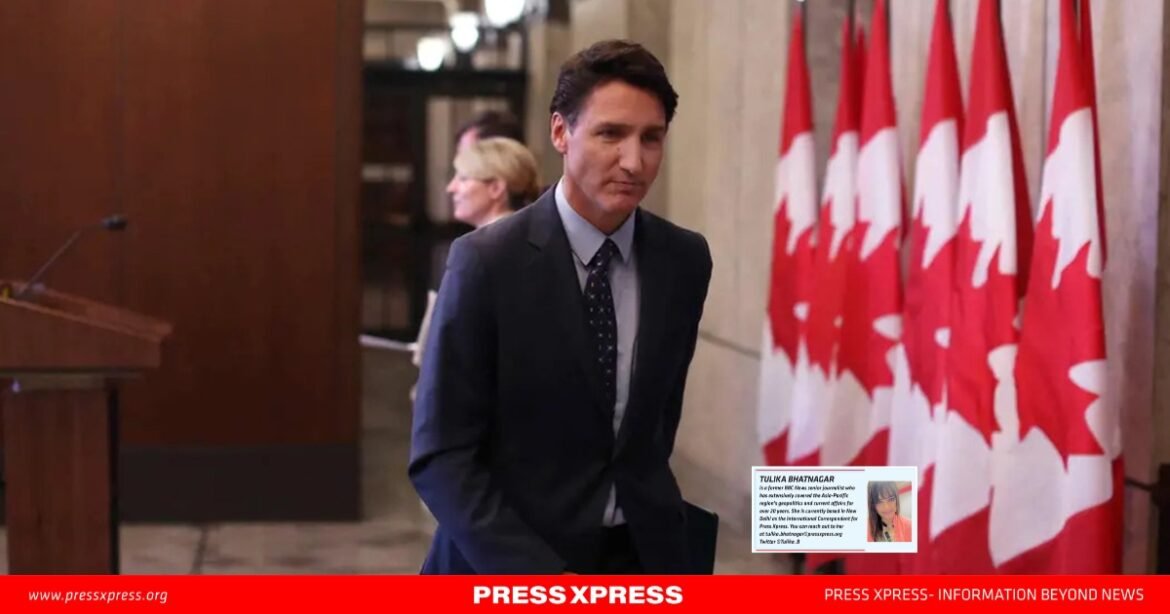Facing increasing dissent within his ruling Liberal Party, Canadian Prime Minister Justin Trudeau is expected to offer his resignation soon, reports say, citing anonymous sources.
The embattled leader, facing consistent political crisis since last year, has been under pressure from elected lawmakers in his party to quit for months. More than 20 Liberal members of parliament have publicly called for Trudeau’s departure, and more have apparently discussed in off-record meetings that Trudeau has no choice but to leave.
The Canadian parliament is currently governed by the Liberals who hold 153 seats in the House of Commons.
On 8 Jan, Trudeau’s ruling Liberal party will hold its national caucus meeting, which decides on leadership issues. This is where Trudeau will face the opposing MPs for the first time since he said he would reflect on his political future amid growing calls for resignation.
According to Scott Reid, political analyst, CTV News, “Trudeau will probably announce his resignation on Monday or Tuesday (6 or 7 January) but if he doesn’t, they (party members) will probably tell him in no uncertain terms that he must leave.”
However, Trudeau’s departure would also leave the Liberal Party without a permanent head at a time when opinion polls show that the Conservatives are tipped to be the winner in the parliamentary election to be held later this year.
Who could replace Trudeau?
Among other names, Canadian Finance Minister Dominic LeBlanc is among the top candidates to replace Trudeau, as the interim leader and the prime minister. Former deputy PM and finance minister Chrystia Freeland is another name doing the rounds. In December 2024, she had had a public stand-off with Trudeau and stepped down, after a disagreement over how to respond to US president-elect Donald Trump’s tariff threats.
Trudeau’s main rival from the opposition Conservative Party is also in the spotlight. Conservative Party leader Pierre Poilievre has been a vocal critic of Trudeau, and currently leads Trudeau’s Liberals by 20 points, which could be enough to form a majority government after the next election.
Why is Trudeau resigning?
Trudeau, 53, rose to power in 2015, and has been in office for 9 years.
One of the main reasons for his political downfall is the major corruption scandal involving the now-defunct Sustainable Development Technology Canada (SDTC). This billion-dollar “green slush fund” was shut down earlier last year after the Auditor General found instances of conflict of interest. It was basically a government fund that gave grants to companies that offered solutions to improve Canada’s environmental record. Allegedly $400 million was handed out to ineligible recipients and for projects unrelated to green tech. This huge scandal would have gone unnoticed, had it not been for a whistleblower.
In fact, critics argue that Trudeau’s stand-off with India over Khalistani separatists was an attempt to distract Canadian voters from this scandal.
This controversy with India was also a key reason for Trudeau’s political downfall.
PressXpress had noted in an analysis last year by this reporter that the India-Canada row will likely affect Trudeau’s internal political crisis, snowballing amid his rapidly declining popularity among the masses.
What happens next?
Once Trudeau resigns, an interim leader will be elected to serve the remainder of the term until the party elects a new leader.
After that, a likely no-confidence vote in the parliament might lead the Liberals to lose majority – they only occupy 153 of the 338 seats currently in the House of Commons. Then, early elections would be imminent.
A third option would be to suspend without dissolving or “prorogue” the parliament. This would allow Trudeau to continue current government policy and dodge the no-confidence vote. However, he might have to face a court challenge as the prorogation in this scenario would be a self-interest move.


